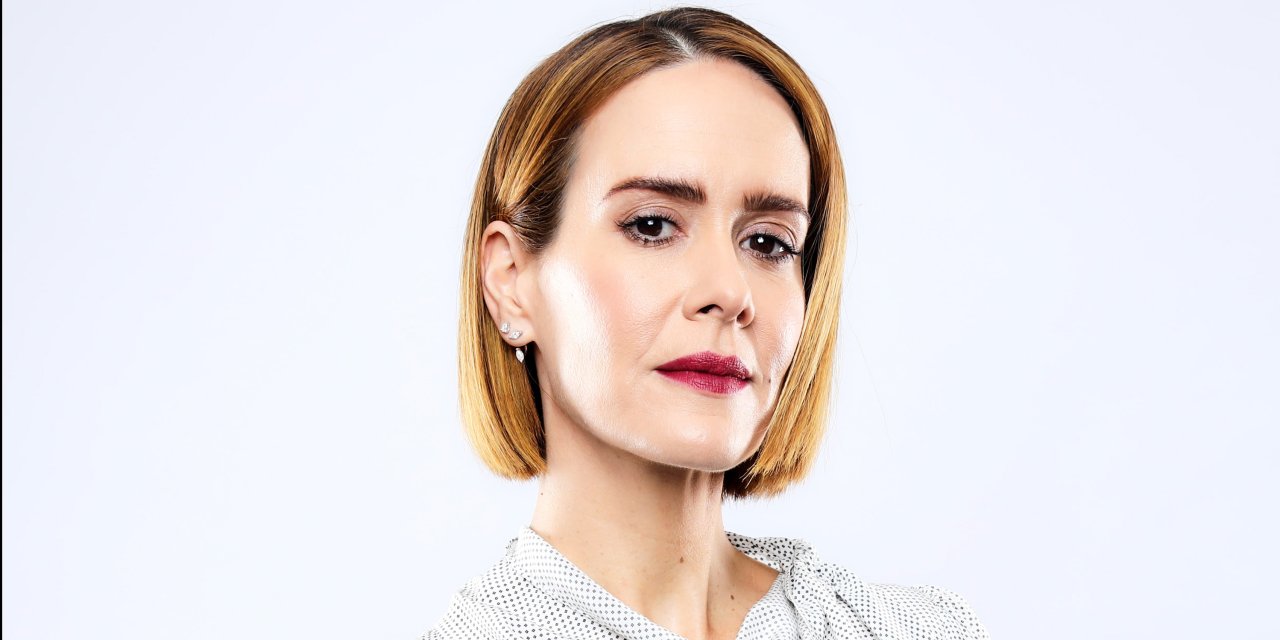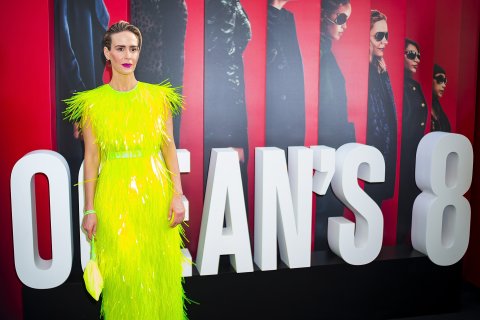
"I think it's my job as an actor to not judge the character I'm playing."
Sarah Paulson has the unique gift of making complicated, and often murderous, women relatable. "It's my job as an actor to not judge the character I'm playing." Rather, she hopes to bring the audience along on the journey, "even if they know it's morally questionable or downright criminal." That's what she does as Diane Sherman in Run (Hulu, November 20). Paulson thinks audiences crave seeing nontraditional characters take center stage right now. "They want to see more narratives that represent their life more accurately. Not that this movie would do that, because then you might have some real trouble in your home life [laughs]."
2020 has already been a stellar year artistically for Paulson, with Run and Netflix's Ratched, which she also exec-produced, but 2021 has Paulson playing one of her most highly anticipated roles: Linda Tripp, the whistleblower at the center of the Clinton-Lewinsky scandal. "I don't know that this will be a radical shift in terms of the way people think about her. But I didn't think about that when I played Marcia [Clark] either." Paulson won an Emmy for her portrayal of the O.J. Simpson murder trial prosecutor. "I felt like if I just played the truth of it, that it would be what it would be. And I feel the same way about Linda."
Run is the latest in a long line of great films about complicated mother/daughter relationships. What drew you to the project?
I got to work with a budding filmmaker [Aneesh Chaganty] whose work was really compelling to me. Also, the idea of doing a movie that was predominantly a relationship-driven story between a mother and a daughter was just really compelling. And Aneesh told me he wanted to cast someone who was not some sort of anointed starlet of the day. His whole approach to the casting of it was also really interesting. I get to be part of watching an actress [Kiera Allen] have her first, real on-set experience. What a wonderful thing to get to witness. Also, the television space has been my home for so long—and I'm so grateful because I think some of the best stuff going is coming out of the television space—but I think it's important to try to keep my toe in if they'll have me in the film world, too.
In fact, you have experience in the troubled mother/daughter area. Your first major role was as the troubled daughter in the 2005 revival of The Glass Menagerie on Broadway.
That was the job that changed my life in every way because it was Jessica [Lange] who reintroduced me to Ryan [Murphy]. I had worked with him a long time ago, but it was her insistence that I be on American Horror Story in some capacity, even just so we could hang out and smoke cigarettes together. Of course, my life was forever changed because of that.
You're such an incredible character actor, probably the best in Hollywood, and with Ratched and now Run, you're finally in the lead. Do you think more projects are being made with unique character roles in the lead?
It seems that way. I don't know if it's just the sort of dovetailing that some of the great actresses that were at the quote-unquote height of their careers in the late '90s and 2000s are now of an age where they're still the greatest actresses in the game. They're just older. And so we find people like Nicole Kidman, Meryl Streep working more than ever. It's kind of incredible. But I wonder if it's both that and audiences being more vocal about what they want to see. A good chunk of the moviegoing and television-watching society is aging as well. They want to see more narratives that represent their life more accurately. Not that this movie [Run] would do that, particularly because then you might have some real trouble in your home life [laughs].
You've perfected playing complicated characters that are sometimes murderous, yet we still oddly root for them. How do you find that relatability in characters like Diane Sherman and Nurse Ratched?
If I say "yes" to the project and to the character, I need to find a way to get behind and support them. Emotionally, spiritually and physically the choices that the character is making will encourage an audience to want me to get what I want, even if they know it's morally questionable or downright criminal.
I think when you approach something as an actor from a place of empathy and compassion and real desire to understand what is motivating a character, you're liable to kind of uncover some real, basic human needs and motivation that might be very relatable to an audience, like loneliness or envy, jealousy, greed, ambition. All of those things are part of the fabric of our lives as human beings, along with joy and happiness and sorrow. I think it's my job as an actor to not judge the character I'm playing. I've got to find some way that I can align myself internally with some of the choices.
Not that I want to go around murdering. At the end of the day, Nurse Ratchet was trying to absolve herself of her guilt over having abandoned her brother and was willing to forsake almost anything to accomplish this, to heal that part of herself or to free herself of that guilt.
I think with Diane, this is a woman who was horribly abused and abandoned as a young woman and her effort to try to recalibrate that trauma for herself created a pretty confused psyche. But I could understand how something like that could happen to someone like Diane. And if I can't try to figure out how and why, then I've got no business saying "yes" to the part in the first place.
Your work with Ryan Murphy has catapulted you into pop culture, with people recreating your roles like Nurse Ratched. Are you surprised by the fan base you've inspired?
It's a pretty heady thing to think about being inspiring or to be a hero to any person or even just to be celebrated, particularly by strangers. It is a strange phenomenon. And yet I find myself really enjoying it. It's hard to talk about without feeling like you're saying sort of self-aggrandizing things. I wonder if it's because I maybe appear to be sort of unafraid and so that can be a kind of galvanizing thing too, to see in another human being; it can sort of make you feel a bit of courage in your own life. When you see someone do something that is perceived as courageous. I do understand that feeling of somebody's work speaking to you in a particular way, that feels so personal and so meaningful. I feel proud of that and humbled to think that someone might have those same kinds of feelings of affection for me and my work. I mean, I'm a person who followed certain actors down the street when I was going to school in New York just to tell them how much they meant to me and practically wept in front of them. So I appreciate it, and I understand where it comes from. It does make me feel a sense of pride.

You've legit become a style icon on the red carpet, particularly with many of the Prada dresses you've worn: the flame dress, the neon green Prada, etc. With everything being virtual now, do you miss dressing up?
I was the kid who slept with a tiara on my head when I was eight years old and in tap shoes and sequined gloves. There's definitely a part of me for which the glamour was sometimes really spectacular. Other times it was just totally horrifying and embarrassing and nerve-racking and exposing and vulnerable-making and all that other stuff. I don't miss that part, and I really don't miss the high heels. There is definitely something that could be so Cinderella-y about it. But in the grand scheme of things, it's pretty far from my mind at the current moment.
You're playing Linda Tripp in the new installment of American Crime Story, which is WILD! What's it like to play such a memorable figure of the '90s?
It's always nerve-wracking. I felt this way when we started Marcia [Clark in The People vs. O.J. Simpson], I felt like, "I don't know what the f*ck I'm doing and what will this be." I think so few people understand or remember that Linda Tripp was a human being. She was a person, you know, not just this monster. A lot of things go into decisions that people make and consequences are felt by them. And it is not nothing for them to have to live with. I don't know that this will be a radical shift in terms of the way people think about Linda Tripp, but I didn't think about that when I played Marcia either. I just tried to be as authentic as possible. And that response was extraordinary. I really felt like if I just played the truth of it, that it would be what it would be. And I feel the same way about Linda. I even spoke to an assistant of hers who worked with her at the Pentagon, and he loved her. It's going to be an interesting thing to calibrate. People's expectations of wanting to hate her right out of the gate and then maybe being confronted with their own thoughts.
Linda. American Crime Story: Impeachment has begun principle photography @MrRPMurphy pic.twitter.com/460EshRhZC
— Sarah Paulson (@MsSarahPaulson) November 13, 2020
Finally, and I know this is out of left field, but like me, you're a big fan of Bravo's Real Housewives franchise. What is it about the Housewives?
I have given thought to this because it is curious to me, and believe me, Holland [Taylor, Paulson's partner] has asked me on many an occasion, "What's the appeal?" And I'm just like, "I don't know!" I think there is something about being a voyeur and watching people behave in unconscious ways. And then being aware that they're going to have to watch it back, and they're going to have to confront the way they've behaved in a way that will be undeniable, like Luann [de Lesseps of Real Housewives of New York City] with the pirate. She was like, "Nothing happened with the pirate." Ma'am, ma'am, ma'am, we all know. And I love me some Luann but it was like, do you forget? The idea that they are letting it all hang out with a kind of willingness, I think there is something almost scientific about it. Like I'm watching through a glass dome, like "Aha, that's what happens when you get jealous?" So I don't know exactly, but believe me, I have given it more thought to it than I care to admit.
About the writer
A writer/comedian based in Los Angeles. Host of the weekly podcast Parting Shot with H. Alan Scott, ... Read more













